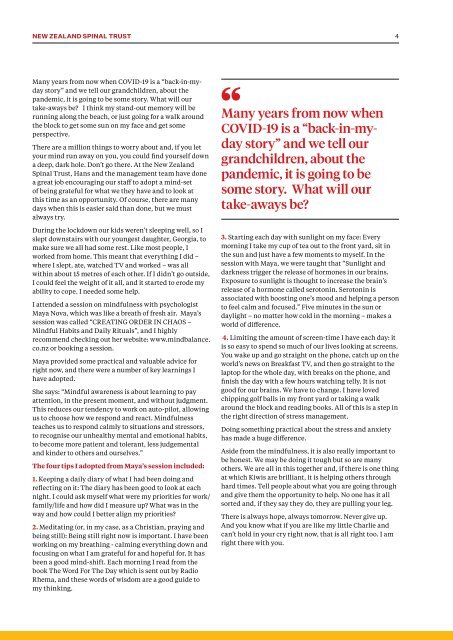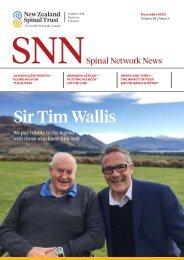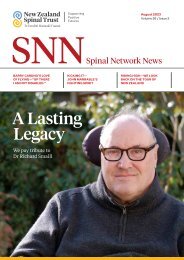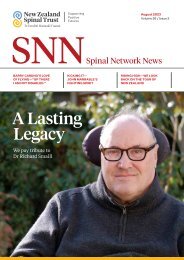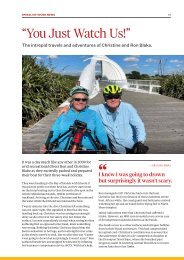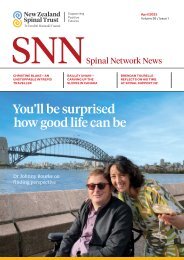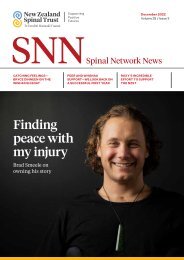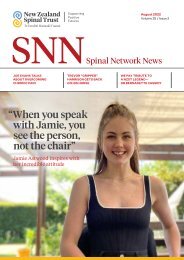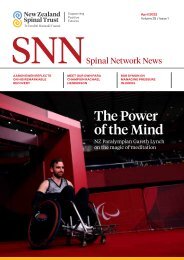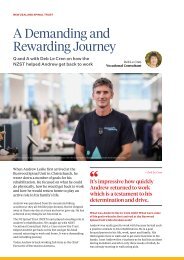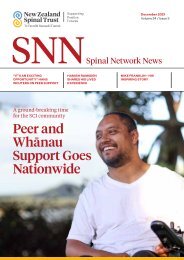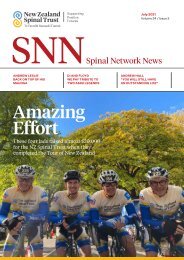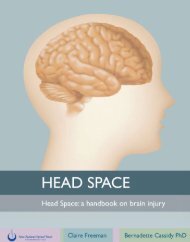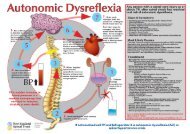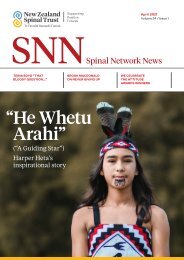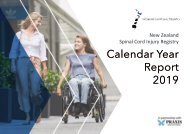SNN_August 2020 Issue FA_low res
You also want an ePaper? Increase the reach of your titles
YUMPU automatically turns print PDFs into web optimized ePapers that Google loves.
NEW ZEALAND SPINAL TRUST 4<br />
Many years from now when COVID-19 is a “back-in-myday<br />
story” and we tell our grandchildren, about the<br />
pandemic, it is going to be some story. What will our<br />
take-aways be? I think my stand-out memory will be<br />
running along the beach, or just going for a walk around<br />
the block to get some sun on my face and get some<br />
perspective.<br />
There are a million things to worry about and, if you let<br />
your mind run away on you, you could find yourself down<br />
a deep, dark hole. Don’t go there. At the New Zealand<br />
Spinal Trust, Hans and the management team have done<br />
a great job encouraging our staff to adopt a mind-set<br />
of being grateful for what we they have and to look at<br />
this time as an opportunity. Of course, there are many<br />
days when this is easier said than done, but we must<br />
always try.<br />
During the lockdown our kids weren’t sleeping well, so I<br />
slept downstairs with our youngest daughter, Georgia, to<br />
make sure we all had some <strong>res</strong>t. Like most people, I<br />
worked from home. This meant that everything I did –<br />
where I slept, ate, watched TV and worked – was all<br />
within about 15 met<strong>res</strong> of each other. If I didn’t go outside,<br />
I could feel the weight of it all, and it started to erode my<br />
ability to cope. I needed some help.<br />
I attended a session on mindfulness with psychologist<br />
Maya Nova, which was like a breath of f<strong>res</strong>h air. Maya’s<br />
session was called “CREATING ORDER IN CHAOS –<br />
Mindful Habits and Daily Rituals”, and I highly<br />
recommend checking out her website: www.mindbalance.<br />
co.nz or booking a session.<br />
Maya provided some practical and valuable advice for<br />
right now, and there were a number of key learnings I<br />
have adopted.<br />
She says: “Mindful awareness is about learning to pay<br />
attention, in the p<strong>res</strong>ent moment, and without judgment.<br />
This reduces our tendency to work on auto-pilot, al<strong>low</strong>ing<br />
us to choose how we <strong>res</strong>pond and react. Mindfulness<br />
teaches us to <strong>res</strong>pond calmly to situations and st<strong>res</strong>sors,<br />
to recognise our unhealthy mental and emotional habits,<br />
to become more patient and tolerant, less judgemental<br />
and kinder to others and ourselves.”<br />
The four tips I adopted from Maya’s session included:<br />
1. Keeping a daily diary of what I had been doing and<br />
reflecting on it: The diary has been good to look at each<br />
night. I could ask myself what were my priorities for work/<br />
family/life and how did I measure up? What was in the<br />
way and how could I better align my priorities?<br />
2. Meditating (or, in my case, as a Christian, praying and<br />
being still): Being still right now is important. I have been<br />
working on my breathing - calming everything down and<br />
focusing on what I am grateful for and hopeful for. It has<br />
been a good mind-shift. Each morning I read from the<br />
book The Word For The Day which is sent out by Radio<br />
Rhema, and these words of wisdom are a good guide to<br />
my thinking.<br />
Many years from now when<br />
COVID-19 is a “back-in-myday<br />
story” and we tell our<br />
grandchildren, about the<br />
pandemic, it is going to be<br />
some story. What will our<br />
take-aways be?<br />
3. Starting each day with sunlight on my face: Every<br />
morning I take my cup of tea out to the front yard, sit in<br />
the sun and just have a few moments to myself. In the<br />
session with Maya, we were taught that “Sunlight and<br />
darkness trigger the release of hormones in our brains.<br />
Exposure to sunlight is thought to increase the brain’s<br />
release of a hormone called serotonin. Serotonin is<br />
associated with boosting one’s mood and helping a person<br />
to feel calm and focused.” Five minutes in the sun or<br />
daylight – no matter how cold in the morning – makes a<br />
world of difference.<br />
4. Limiting the amount of screen-time I have each day: it<br />
is so easy to spend so much of our lives looking at screens.<br />
You wake up and go straight on the phone, catch up on the<br />
world’s news on Breakfast TV, and then go straight to the<br />
laptop for the whole day, with breaks on the phone, and<br />
finish the day with a few hours watching telly. It is not<br />
good for our brains. We have to change. I have loved<br />
chipping golf balls in my front yard or taking a walk<br />
around the block and reading books. All of this is a step in<br />
the right direction of st<strong>res</strong>s management.<br />
Doing something practical about the st<strong>res</strong>s and anxiety<br />
has made a huge difference.<br />
Aside from the mindfulness, it is also really important to<br />
be honest. We may be doing it tough but so are many<br />
others. We are all in this together and, if there is one thing<br />
at which Kiwis are brilliant, it is helping others through<br />
hard times. Tell people about what you are going through<br />
and give them the opportunity to help. No one has it all<br />
sorted and, if they say they do, they are pulling your leg.<br />
There is always hope, always tomorrow. Never give up.<br />
And you know what if you are like my little Charlie and<br />
can’t hold in your cry right now, that is all right too. I am<br />
right there with you.


